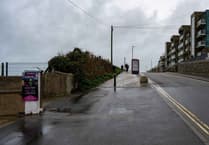Concerns about noise travelling across a Cornish bay and disturbing residents opposite a planned New Year’s Eve party were raised at a Cornwall Council licensing meeting on Monday, October 21.
Popular pop-up dance club Skybar had applied to the council for a temporary events notice (TENs) to hold a NYE party in the Sandy Acres coastal car park near the campsite of the same name outside Hayle.
However, the council’s environmental health department opposed the licence for the event, which would run from 4pm on December 31 to 2am on January 1 for around 400 people. An officer said that complaints had been received about noise following two other Skybar events in the car park earlier this year.
James Watson is the director of Skybar, which has been running for 12 years at locations across the South West, from Bristol down to Cornwall. He told the meeting he had a premises licence to hold two events a year at Sandy Acres, both of which had already taken place in May and September, hence the application for a TENs for new year.
He was asked to hold the event by popular local band Sandy Acre 7 so they could play one last gig before splitting up. Mr Watson said he lodged the notice application with noise and events management plans in place.
He said he contacted Michelle Cowie from the council’s environmental health department to discuss noise concerns prior to today’s meeting but didn’t get a response. “I’d like to say we’ve got quite a good reputation within Cornwall for liaising with licensing, environmental health and other authorities when needed,” he added.
The meeting heard the car park is nestled between two dunes in St Ives Bay, about a seven to eight minute drive from the main road, and is opposite Carbis Bay. Mr Watson said that after receiving a few complaints following the May event, the Skybar team did everything they could to mitigate the concerns, including carrying out sound checks on the St Ives and Carbis Bay side of the bay.
Ms Cowie told the licensing committee: “After the first event in May we had five complaints about the music and we discussed reorienting the speakers to point away from Carbis Bay and yet we had a complaint for this event in September from the Carbis Bay area again.
“The licence states that a noise management plan has to be submitted two months prior to an event – we didn’t receive that for the September event. When the monitoring records were requested I assumed to use the noise levels from the previous noise management plan in May. A number of times during the September event the noise recorded actually breached the noise management levels for the previous event.”
The environmental health officer added: “The event applied for is for ten hours. The previous events saw monitoring from 6pm to 11pm. Having a complaint for the September event and complaints for the previous event, which were fives hours, I’m concerned about how many complaints we’re going to have for a ten-hour event. Even if one person is affected, it’s a lot different being affected for ten hours than it is for five hours. If people are kept awake until 2am, it’s a lot different than 11pm.”
The complaint following the September party concerned an Ibiza-style night when “the bass was loud and impacted the whole of the bay”. Ms Cowie commented that noise travels over water.
Mr Watson argued that a noise management plan was sent to the council for both the May and September events, though he admitted he may not have emailed the September plan to environmental health.
“We are talking about New Year’s Eve here – it’s not a Sunday in the middle of the summer. It’s probably one of the biggest dates in the year for temporary events notices,” he added. “We’re trying to provide something for the Hayle area.”
Commenting on a lack of response from the environmental health department prior to the meeting, Mr Watson said: “If people engaged with us about their concerns, we probably wouldn’t need to be here.”
The events notice was granted as the committee felt the fact that the event was on New Year’s Eve was an important consideration and that, on balance, there was insufficient evidence that the prevention of public nuisance licensing objective would be undermined.





Comments
This article has no comments yet. Be the first to leave a comment.